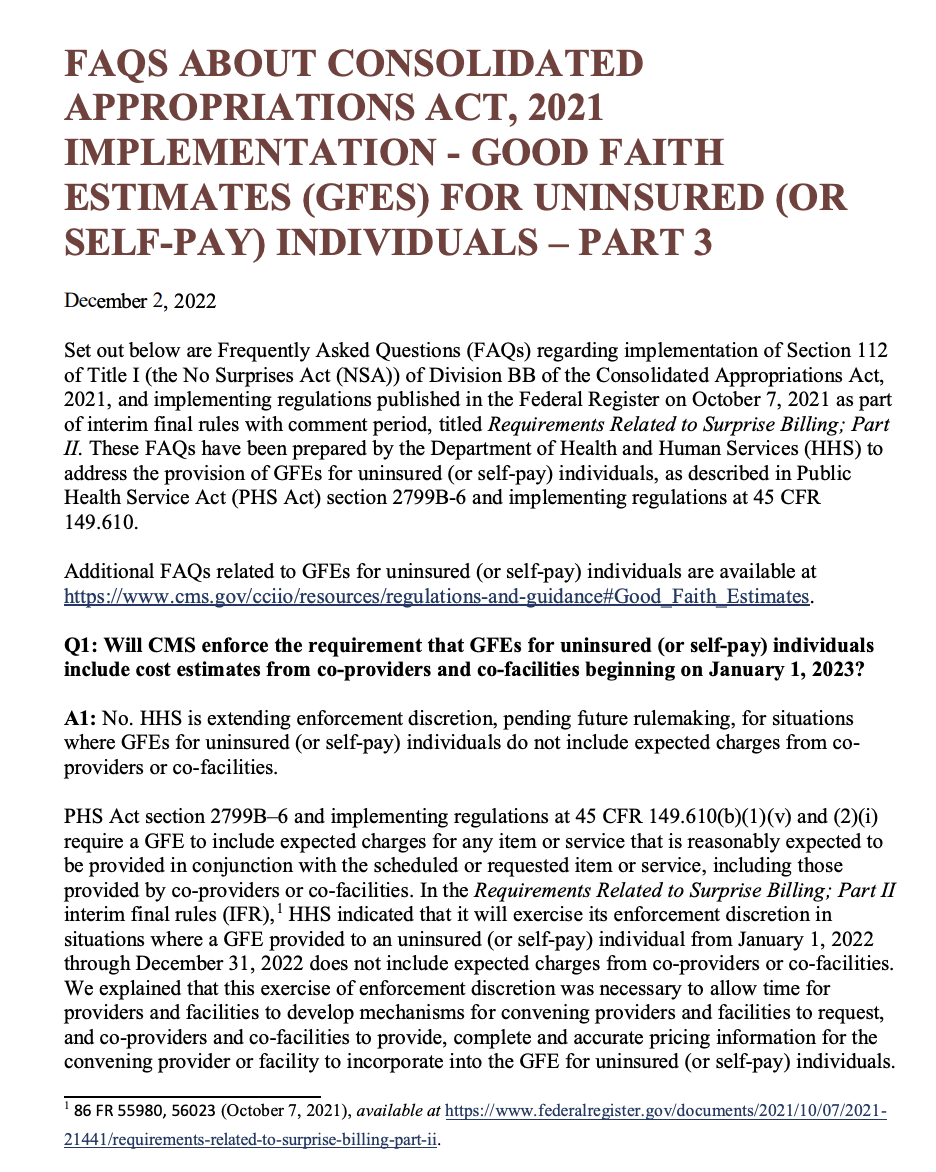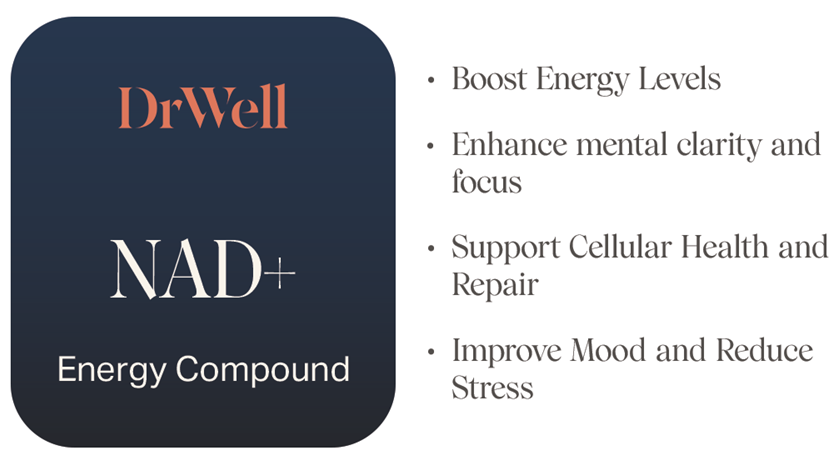FAQS ABOUT CONSOLIDATED APPROPRIATIONS ACT, 2021 IMPLEMENTATION – GOOD FAITH ESTIMATES (GFES) FOR UNINSURED (OR SELF-PAY) INDIVIDUALS – PART 3
December 2, 2022
Set out below are Frequently Asked Questions (FAQs) regarding implementation of Section 112 of Title I (the No Surprises Act (NSA)) of Division BB of the Consolidated Appropriations Act, 2021, and implementing regulations published in the Federal Register on October 7, 2021 as part of interim final rules with comment period, titled Requirements Related to Surprise Billing; Part II. These FAQs have been prepared by the Department of Health and Human Services (HHS) to address the provision of GFEs for uninsured (or self-pay) individuals, as described in Public Health Service Act (PHS Act) section 2799B-6 and implementing regulations at 45 CFR 149.610.
Additional FAQs related to GFEs for uninsured (or self-pay) individuals are available at https://www.cms.gov/cciio/resources/regulations-and-guidance#Good_Faith_Estimates.
Q1: Will CMS enforce the requirement that GFEs for uninsured (or self-pay) individuals include cost estimates from co-providers and co-facilities beginning on January 1, 2023?
A1: No. HHS is extending enforcement discretion, pending future rulemaking, for situations where GFEs for uninsured (or self-pay) individuals do not include expected charges from coproviders or co-facilities.
PHS Act section 2799B–6 and implementing regulations at 45 CFR 149.610(b)(1)(v) and (2)(i) require a GFE to include expected charges for any item or service that is reasonably expected to be provided in conjunction with the scheduled or requested item or service, including those provided by co-providers or co-facilities. In the Requirements Related to Surprise Billing; Part II interim final rules (IFR),1 HHS indicated that it will exercise its enforcement discretion in situations where a GFE provided to an uninsured (or self-pay) individual from January 1, 2022 through December 31, 2022 does not include expected charges from co-providers or co-facilities. We explained that this exercise of enforcement discretion was necessary to allow time for providers and facilities to develop mechanisms for convening providers and facilities to request, and co-providers and co-facilities to provide, complete and accurate pricing information for the convening provider or facility to incorporate into the GFE for uninsured (or self-pay) individuals.
HHS has received comments and feedback indicating that compliance with this provision is likely not possible by January 1, 2023, given the complexities involved with developing the technical infrastructure and business practices necessary for convening providers and facilities to exchange GFE data with co-providers and co-facilities. Stakeholders have requested that HHS further delay the enforcement of this provision until HHS has established a standard technology or transaction to automate the creation of comprehensive GFEs and given providers and facilities sufficient time to implement such standards.
HHS believes that to achieve industry-wide interoperability for the transmission of GFE data between convening providers and facilities and co-providers and co-facilities, the next step is for providers and facilities market-wide to adopt a standards-based application programming interface (API) for this purpose. Pursuing API-based standards for the exchange of GFE data is part of a larger HHS strategy to encourage and support the adoption of health information technology to promote bi-directional data exchange to improve the quality of care and promote a more efficient health care system. HHS has indicated that the Health Level 7 (HL7®) Fast Healthcare Interoperability Resources (FHIR®) standard holds potential for supporting interoperability and enabling new entrants and competition throughout the health care industry and continues to support efforts towards developing such a standard.2
By extending this exercise of enforcement discretion, HHS aims to promote further interoperability across the health care industry and encourage providers, facilities, and other industry members to focus resources towards adopting interoperable processes for exchanging information. We note that any rulemaking to fully implement the requirements of PHS Act section 2799B–6 related to uninsured (or self-pay) individuals will include a prospective applicability date that gives providers and facilities a reasonable amount of time to comply with any new requirements.
HHS encourages states that are primary enforcers of these requirements to take a similar approach and will not consider a state to be failing to substantially enforce these requirements if it takes such an approach while HHS is exercising enforcement discretion.
Keep in mind that the BuildMyHealth platform already has the capability of including all associated costs in the Good Faith Estimate so your practice/facility can still comply with the rules surrounding the role of the convening provider.
Original CMS notification can be found here in PDF format.
———–
1 86 FR 55980, 56023 (October 7, 2021), available at https://www.federalregister.gov/documents/2021/10/07/2021- 21441/requirements-related-to-surprise-billing-part-ii.
2 Interoperability and the Connected Health Care System (December 8, 2021), available at https://www.cms.gov/ blog/interoperability-and-connected-health-care-system; see also Request for Information; Advanced Explanation of Benefits and Good Faith Estimate for Covered Individuals, 87 FR 56905 (September 16, 2022), available at https://www.federalregister.gov/documents/2022/09/16/2022-19798/request-for-information-advanced-explanationof-benefits-and-good-faith-estimate-for-covered.




